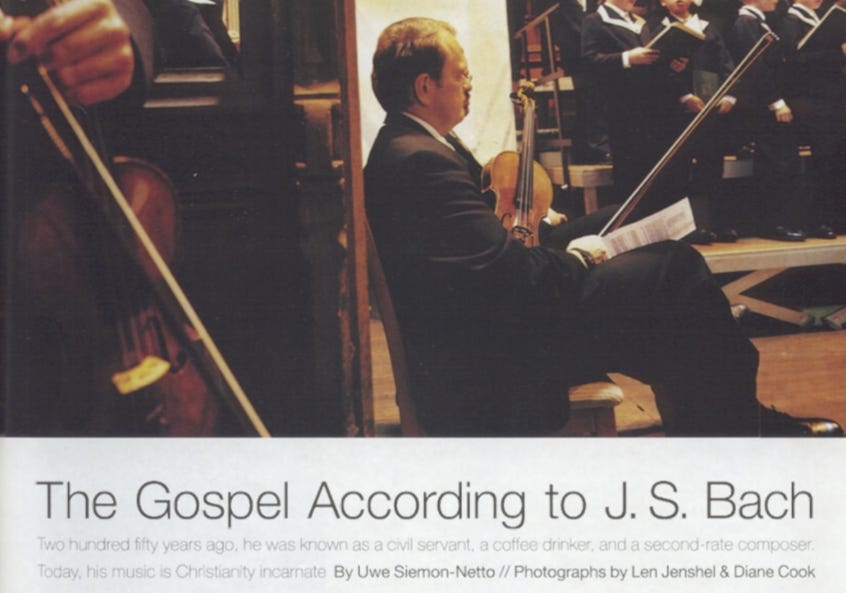The Siemon-Netto Thesis
22 years ago, a Lutheran journalist praised Bach as Japan's evangelist par excellence
(updated references, title for Johannes Richter)
My first encounter with the evangelical import of Bach in Japan came some twenty years ago from the pen of Lutheran journalist-theologian Uwe Siemon-Netto, a Leipzig native. Intrigued, perhaps, by the throngs of Japanese pilgrims who came to celebrate Bach in his hometown, Siemon-Netto set out for Japan to investigate.
“J.S. Bach in Japan,” published in First Things, highlighted the broad fervor and appreciation for Bach’s artistic and spiritual depth, particularly among Japan’s highly secularized elite. Bach teaches hope to a people without even the concept of it, he claimed. Siemon-Netto paints Bach’s effect dramatically: for these troubled masses, alienated by collapsing opportunity and the materialistic void left behind, Bach is balm against suicide, pornography, and complete generational breakdown.
Bach is a Christian preacher, too. “It is impossible to say how many of my performers and listeners will ultimately become Christians,” said Masaaki Suzuki to Siemon-Netto, but Suzuki “believes...that Bach has already converted tens of thousands of Japanese to the Christian faith,” reports the journalist.
I know of no reliable statistics on the matter, but anecdotes abound. Siemon-Netto mentions, for example, that his non-Christian law student-interpreter started out their day with by playing the cantata Vernügte Ruh, beliebte Seelenlust (BWV 170), which features an explanation of God’s name as “love.” He quotes her saying, “This has taught me what these two words mean to Christians... And I like it very much.”
Even more dramatic is Siemon-Netto’s tale of musicologist Keisuke Maruyama, who, after careful study in Leipzig of the Lutheran lectionary cycles, pleaded with Thomaskirche dean Johannes Richter: “It is not enough to read Christian texts, I want to be a Christian myself. Please baptize me.”
Is it in Japan where Bach has miraculously fulfilled the apostolate assigned him by Swedish bishop Nathan Söderblom, that of “The Fifth Evangelist”?
It’s not just ancient history. Last year, in my own Tokyo congregation, a young Japanese music student was baptized because of Bach. He was so moved by how Bach blessed the people around him (in contrast to how this student perceived his own impact on the world) that he concluded he needed to become a Christian, too. As a result, he was baptized at Tokyo Lutheran Church.
I don’t think I’m alone in remembering the tale of Bach in Japan as Uwe Siemon-Netto told it. Not long ago, when my wife mentioned this “Bach in Japan” project to an Evangelical friend, she immediately recalled learning in her graduate program in theology that Japan was a Bach-loving country. And wasn’t he the best evangelist there?
Yes, Bach’s music is certainly loved in Japan. With a bit of catechesis, perhaps his faith will come to be embraced as well.
References
“J. S. Bach in Japan” First Things, June 2000.
“The Gospel According to J. S. Bach,” Civilization, February/March 2000.
“Bach’s Missionary Mystery,” The Cresset, 2004.
“Why Nippon Is Nuts about J. S. Bach: The Japanese Yearn for Hope,” The Atlantic Times, December 2005.
“Bach in Japan,” Christian History and Biography, 2007.
“How Bach became a Hit in Japan,” 1517.org, January 8, 2016.
Mary Rezac, “How the Beauty of Bach’s Music Evangelized Japan. An Interview with Uwe Siemon-Netto,” Catholic News Agency, June 2, 2016.


